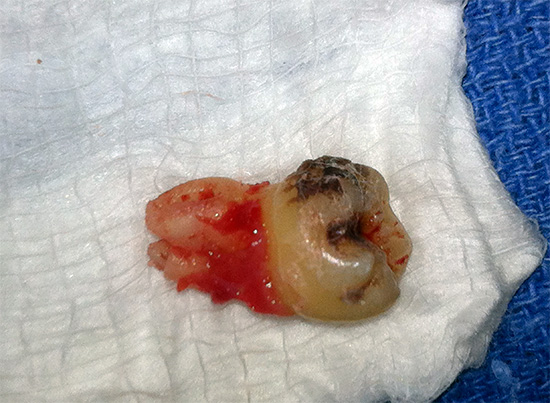
Next you will learn:
- What are the consequences of removing wisdom teeth?
- What unpleasant situations may arise directly during tooth extraction;
- Dangerous complications, sometimes arising a bit later - when you already come home from the dentist surgeon;
- And also, is it possible to lose the sensitivity of part of the face and chin when losing teeth, to lose vision, and in general, how to act if something went wrong.
Although numerous stories about the possible unpleasant consequences of removing wisdom teeth did not arise out of thin air, the associated risks should not be overestimated. Extraction of teeth (not only wisdom, but in general) is indeed a rather traumatic procedure, and not always during and after such surgical intervention everything goes smoothly. However, as practice shows, it is much more dangerous not to remove a wisdom tooth with appropriate indications than to contact a dental surgeon for help.
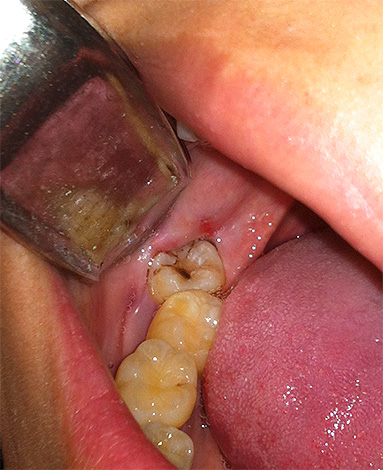
On a note
For example, the non-removal of retinated or semi-reinforced wisdom teeth (that is, with the eruption of which there are difficulties) often leads to rather serious inflammatory processes. Against the background of a weakened immune system, such inflammations can even pose a threat to a person’s life - there are cases when a lack of timely surgical intervention led to deaths.
Below will be described many different dangerous and simply unpleasant consequences of removing wisdom teeth, which doctors and their patients most often have to face. However, the information provided is not intended to scare the reader before a visit to a dental surgeon, but to give an understanding of the whole picture, while showing how to act in case of a problem situation.
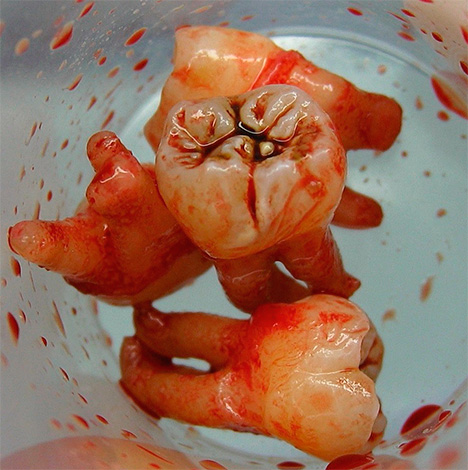
Complications that sometimes occur during the removal of a wisdom tooth, as well as their consequences
The upper and lower wisdom teeth erupt later than all other teeth (according to statistics, usually 18-25 years old), so in most cases they simply do not have enough free space. That is why even a wisdom tooth, which initially had a normal structure and location in the jaw, often begins to deform in the process of its development and eruption.
This applies, first of all, to the roots of the tooth, which can bend in the jaw in any way, just to give the crown part the opportunity to turn in such a way that it still comes to the surface from under the gum and stands in the dentition. The result of all these “trials on the way to the light” is the bending of the roots of the wisdom tooth, unique for each person, and sometimes its absolutely incredible position in the dentition (if, of course, it cuts through the gum).
The photo below shows the initial stages of the procedure for removing the retinirovannogo wisdom tooth (that is, hidden under the gum):
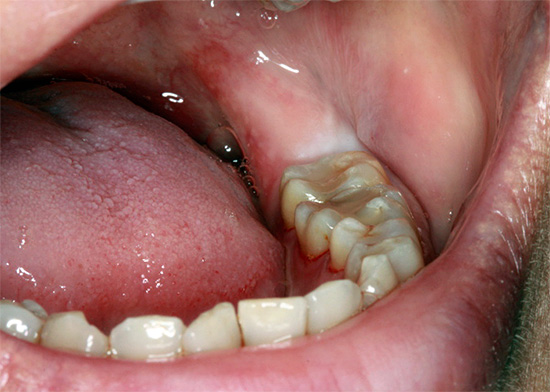
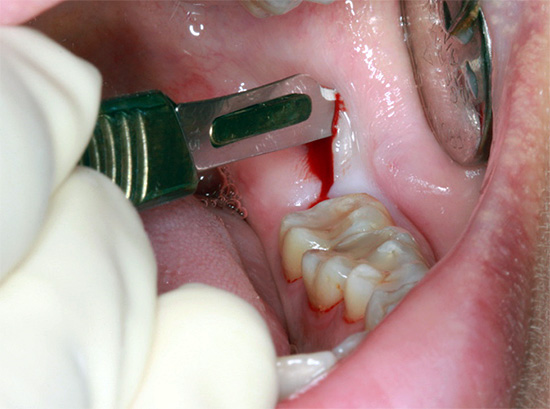
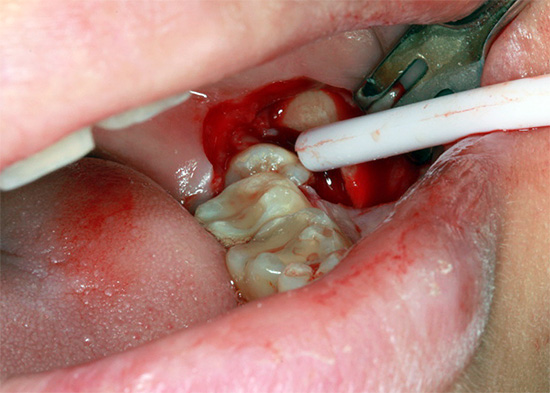
If it comes to tooth extraction, then the dentist-surgeon evaluates the complexity of the upcoming procedure. And the more obstacles a given clinical situation suggests for simple extraction of a tooth from the socket with forceps, the more likely it is to develop a scenario of atypical (complex) removal of a wisdom tooth, which under certain scenarios may well have unpleasant consequences for the patient.
Factors complicating the wisdom tooth extraction procedure include:
- pronounced inclination of the tooth towards the cheek or in the oral cavity;
- low location of the crown in relation to the adjacent seventh tooth;
- strongly curved roots (sometimes even at right angles - see the example in the photo);

- the proximity of the roots to the maxillary sinus or mandibular canal;
and some others
A significant part of the unpleasant consequences of the removal of wisdom teeth observed in dental practice is largely associated with medical errors. And the more inexperienced the dental surgeon, the higher the risk of such errors.
For example, during a wisdom tooth extraction procedure, the following situations may arise:
- A fracture or dislocation of an adjacent tooth - this occurs when a tooth adjacent to the extraction site receives a large load, as a result of which it breaks or starts to stagger (not quite an experienced doctor takes it as a support for the elevator, which removes the wisdom tooth).

Comment of the surgeon
In case of accidental injury to the adjacent tooth, the patient rarely experiences pain, since usually 2-3 or more teeth enter the anesthesia zone. Most often, a crown fracture occurs in a filled adjacent tooth, often dead, due to insufficient resistance of its hard tissues to the load (strength decreases due to the absence of the neurovascular bundle that previously fed such a tooth).
In the practice of most dental surgeons with more than 10 years of experience, there must have been at least 1 case of accidental “tugging” of a filling on the adjacent tooth. Almost always, this happens to be an “old” filling that has long been in need of replacement, but explaining to a patient why after having to remove a tooth he needs to go to re-insert the lost filling is not easy.
In case of a significant fracture of the crown of the tooth, depending on the clinical situation, it can be restored using composite materials of light curing with or without a pin, and a tab and / or crown should be placed. But with significant damage to the crown part, it may well be necessary to remove this tooth (further prosthetics with bridges or implants are possible).
- Damage to the gums and other soft tissues in the oral cavity. With inaccurate mastery of the wisdom tooth extraction technique, the gum tissue surrounding it may simply be torn and crushed. During excessive efforts of the dentist-surgeon in case of accidental slipping of the forceps and elevator, even a serious cut or rupture of tissues can occur, leading to prolonged bleeding and requiring emergency care in the form of suturing.

- Fracture of the site of the alveolar process. With a deep grip of the tooth with forceps, it is possible to break off the part of the bone that previously held it from the outside or inside (the patient then sometimes feels the sharp edges of the bone in place of the tooth hole). The consequence is often prolonged healing of the hole.
- An unexpected and unpleasant consequence of tooth extraction in general, especially the lower molars, is sometimes a fracture or dislocation of the lower jaw. Professional dentist surgeons know that removing a wisdom tooth normally does not require the application of significant physical strength, as there are many ways to remove it, even if the tooth "does not go."
- Perforation of the maxillary sinus - pushing the root of the upper wisdom tooth or even the entire tooth into the maxillary sinus. The consequence of this, frankly, unpleasant situation is that it will be necessary to remove this very foreign object from the sinus - for this, a hole is made in the bone through which the object extends.
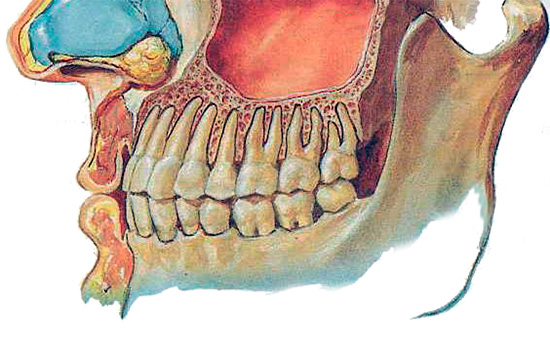
As for pain during the removal of wisdom teeth: this procedure can be carried out absolutely without pain, but the main thing here is to conduct a good anesthesia. Poor anesthesia is still one of the most problematic issues in the work of dental surgeons. Therefore, most people are afraid of precisely the possible pain during tooth extraction, and not bleeding, hematoma, alveolitis, etc.
A high percentage of the risk of painful extraction of the wisdom tooth belongs to budgetary medical institutions (polyclinics, hospitals), where, according to the standards, only 15-20 minutes are allocated per patient. During this time, in normal private clinics, the doctor only has time to get to know the person, and in the budgetary institution, the dentist-surgeon needs to figure out in these 15 minutes which tooth needs to be removed, undergo anesthesia, wait for its action, and after that it is almost instantly carried out.
Of course, when 10-15 or more people accumulate in the corridor, there can be no talk of any full-fledged anesthesia. It is no coincidence that surgeons have a joke: "remove teeth under Cricaine." Cricaine is not a drug, but a derivative of the word cry. At a free or almost free reception, screams of patients from pain do not rarely occur, especially when removing the lower sixth, seventh and especially eighth (wise) teeth, since it is not possible to conduct a high-quality anesthesia in haste.
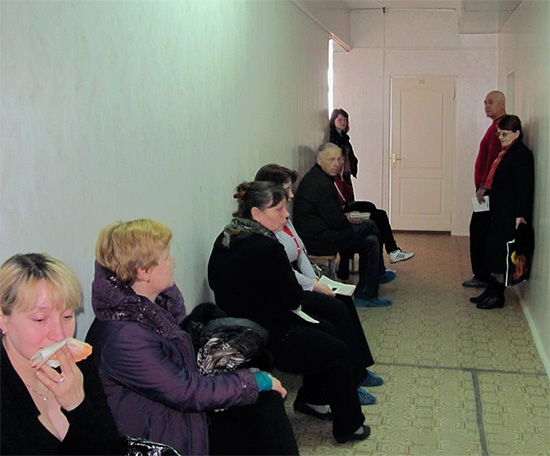
Note: “Is it possible after upper wisdom tooth extraction or fang lose sight? ”
For some reason, the people have long had a myth that fangs are the so-called "eye" teeth, and that their removal can lead to vision problems, as their roots are supposedly close to the optic nerve (this myth gradually spread to the upper teeth wisdom). However, this legend has no medical basis, since even the longest of all teeth, the roots of the canine do not reach the eye at all and do not damage the optic nerves during removal.
The consequences that arise after the removal of the wisdom tooth
After it turned out to successfully pull out a wisdom tooth, and, it would seem, everything is already behind, a person may not be aware of possible additional unpleasant consequences, slightly delayed in time. And problems can begin already at home: either immediately, or in the evening, or in a day or two.
Possible immediate consequences in time after the removal of a wisdom tooth (as well as any other, especially radical):
- A significant increase in pain - with the termination of the anesthetic;
- Prolonged bleeding from the hole when the blood does not want to stop;
- Fever;
- Hematoma;
- Paresthesia (prolonged loss of sensitivity of the cheek, chin, lips, tongue).
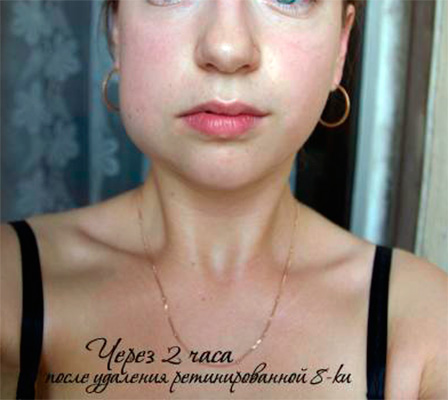
Pain after removing a wisdom tooth
Generally speaking, pain is a normal response of the body to an injury in the oral cavity caused by tooth extraction and rupture of previously surrounding tissues. The more tissue damaged, the usually higher the intensity of pain.
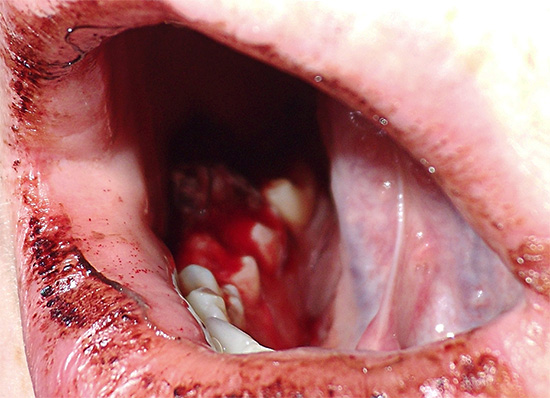
On the first day of any tooth extraction, pain medications are recommended. Dosage and specific drug are selected individually. In this case, allergic reactions, tolerance of a particular drug and its effect in the past, duration of action, effectiveness of the drug (strength), as well as human financial capabilities are taken into account.
It is interesting
Local anesthesia (infiltration, palatine) on the upper teeth acts no more than an hour, but subjectively it can be felt about 1.5-2 hours. For the lower wisdom teeth, a different anesthesia technique (mandibular, torusal) is performed, which lasts 1-1.5 hours, but the feeling of “freezing” on half of the face lasts up to 4-8 hours or more. In this case, the cheek, half of the lip, the tip of the tongue, etc. the removal side does not have normal sensitivity during this time. While anesthesia is in effect, pain does not occur after removal.
Prolonged bleeding from the tooth socket
Bleeding that occurs immediately after tooth extraction is a natural process necessary to fill a hole with a blood clot, which will prevent infection from entering the wound. If the hole does not bleed (sometimes the “dry hole” effect is actually observed), then this always creates an increased risk of developing alveolitis - inflammation and suppuration of the hole.
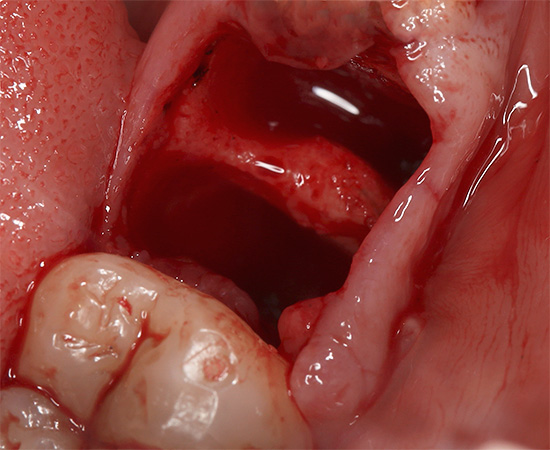
However, prolonged bleeding from the hole (more than a few hours) is not considered the norm. The consequence of such bleeding can be an article of a general deterioration in a person’s well-being, in rare cases up to loss of consciousness.
On a note
Sometimes bleeding begins already at home, when the vasoconstrictor effect of adrenaline, which is usually part of the drugs used for local anesthesia, ends.
Usually, after the removal of the wisdom tooth, the dentist immediately or after suturing on the edges of the gums around the hole puts a sterile gauze swab and recommends that the patient harder push it with the opposite teeth. The force of squeezing the edges of the hole partly determines the speed of stopping the bleeding.
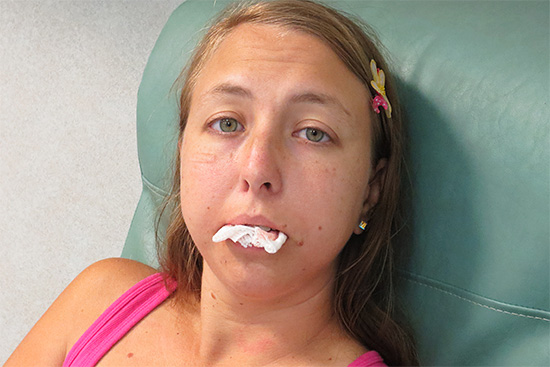
According to the situation, a special hemostatic (hemostatic sponge) or other drugs can be introduced into the hole to stop bleeding in people at risk of prolonged bleeding (high blood pressure, taking blood thinners, and diseases associated with clotting disorders).
However, the local use of hemostatic drugs does not always give the desired effect, therefore it is important to diagnose the main cause of bleeding (if any) in time and quickly eliminate it:
- Lower blood pressure;
- A few days before the tooth is removed, in agreement with the attending physician (therapist, cardiologist), stop taking drugs that violate blood coagulation;
- Monitor blood sugar in diabetes, etc.
If blood after tooth extraction wisdom does not stop for a long time, it’s better to call a specialist (perhaps the doctor who removed the tooth) and ask you to advise you on further actions.
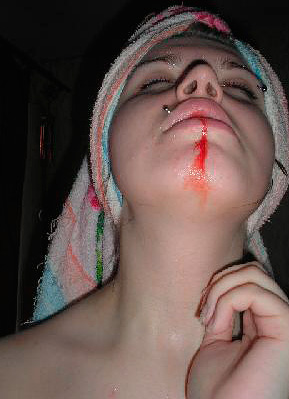
Is temperature dangerous after removing a wisdom tooth?
The consequence of removing a wisdom tooth, especially in the case of a traumatic procedure, often becomes a significant increase in body temperature after several hours, more often in the evening.
An increase in temperature is the result of an inflammatory reaction of the body in response to trauma (but not only). However, even if the temperature rises on the first day to 38-39 degrees, this does not mean serious suppuration of the hole and the danger of developing an infectious process, but only requires dynamic observation and alertness from a person. High temperature (above 38) can be brought down with appropriate drugs.
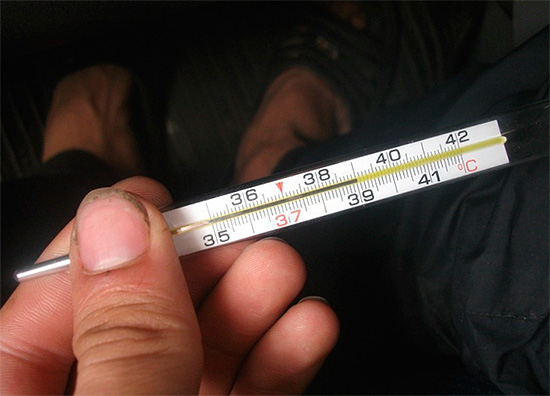
Feedback:
“Yesterday I removed the lower tooth of wisdom, the figure eight, everyone there turned me around. They tormented an hour, then they put seams. And in the evening everything was very painful, the temperature rose. It was already 39.3 at night, they knocked down my husband with pills and a cold towel. Now 37.2, I'm sitting on Nurofen, my whole cheek hurts and swollen ... "
Oksana, Moscow
How do you know when a fever is the norm, and when should you sound the alarm? A slight increase in temperature to 37.5 degrees fits the conditional definition of “norm”, as well as a sharp increase to 38.1-38.2, followed by a decrease by the end of the day. The fact of the disappearance of the temperature syndrome on the first day (maximum on the second) after tooth extraction is important.
If the temperature continues to rise again regularly (as the antipyretic drug ceases), the gums are very sore, and especially if there is a putrid odor from the mouth - in this case, you should immediately consult a doctor.
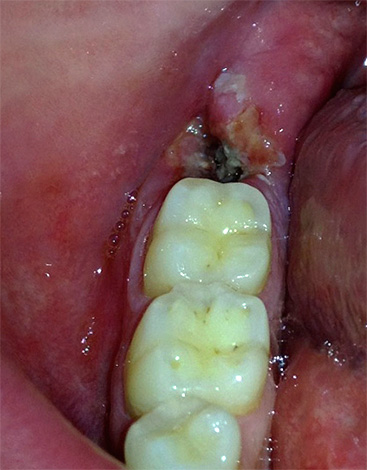
Why is it important to consult a doctor if you suspect a "bad" temperature?
An increase in temperature can be not only a consequence of a complicated and traumatic removal of a wisdom tooth, but it can also be an indicator of the development of a dangerous infection process in the hole against the background of the mistakes made by the dentist:
- abandoned root or part of a tooth in the gum;
- pushing carious tissues or left cysts and granulomas deep into the hole;
- dry hole effect and its inflammation;
- perforation of the maxillary sinus, pushing the root of the tooth into it with the development of sinusitis;
etc.
That is why it is so important to consult a dentist in time for a consultation so that he examines the hole and takes an x-ray.
Hematoma on the face after removal of a wisdom tooth
Provoking factors:
- Damage to the vessel during local anesthesia;
- High blood pressure;
- Increased fragility of capillaries.
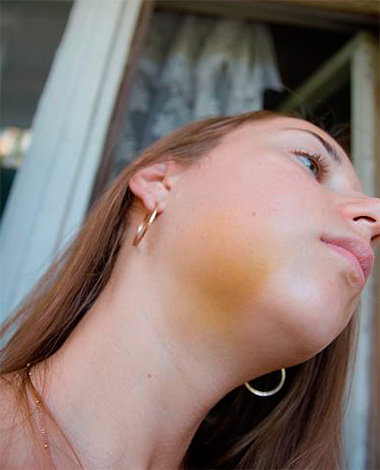
Feedback:
"Hello! On the eve of my wisdom tooth was pulled out on the lower jaw and during the freezing a very painful injection was given, I already jumped in the chair. After tooth extraction, a bruise under my jaw grew on the very first day. And with the naked eye it is visible that the cheek is swollen. I turned to the same doctor, they told me that maybe this is an allergy (just what is asked) and Suprastin was prescribed. At the moment, the swelling was a little asleep, but the bruise remained, as well as concerns about it. What to do with this bruise under the jaw, is this normal? ”
Alexander, Pskov
Generally speaking, the appearance of a hematoma is in most cases not as scary as it might seem due to the formidable appearance of a purple bruise. Such a bruise usually quickly resolves by itself.
The main emphasis should not be placed on the appearance of the bruise, but on monitoring the progress of the healing of the hole. At the slightest suspicion of alveolitis (suppuration from the hole, unpleasant odor, decomposed or missing blood clot, severe pain that does not pass away and high fever), you do not need to sit at home and wait for everything to resolve itself - you should go to the dentist for a consultation as soon as possible.
Paresthesia on the background of damage to the mandibular nerve
Pretty rare, but quite unpleasant a consequence of removing a wisdom tooth in the lower jaw there may be a temporary (and sometimes permanent) loss of sensitivity in certain areas of the cheek, lips, tongue and chin - paresthesia.
Risk factors for developing paresthesia after extraction of the lower wisdom tooth:
- The special location of the roots and a high degree of activity of the inflammatory process on the roots. The closer the roots or granulomas or cysts located on them to the mandibular canal, where the mandibular nerve passes, or to the lingual nerve, the higher the risk of loss of sensitivity of the corresponding area.
- Medical factor. Timely diagnosis of the proximity of the roots to the mandibular canal makes it possible to plan surgical intervention in advance. The surgeon's experience and the technique used during the removal of a wisdom tooth determine the likelihood of developing paresthesia due to the fault of the doctor.
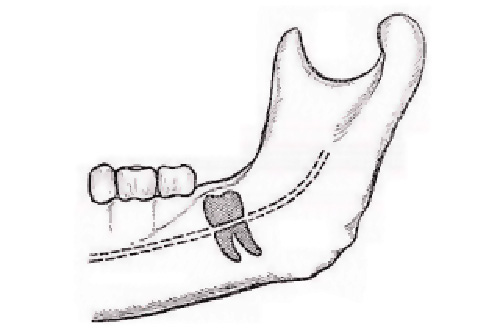
Paresthesia is a phenomenon in which there is a loss of pain, temperature, taste, sensory and proprioceptive sensitivity, but there is no paralysis. That is, the face retains its previous appearance, is not skewed, and the patient's subjective sensations are comparable to an endlessly continuing anesthesia. Most often, the chin, tongue and lip remain numb.
Usually paresthesia itself goes away after a couple of weeks, but sometimes the restoration of nerve tissue requires help in the form of the appointment of physiotherapeutic procedures and (or) special drugs. In very rare cases, loss of sensation can last forever.
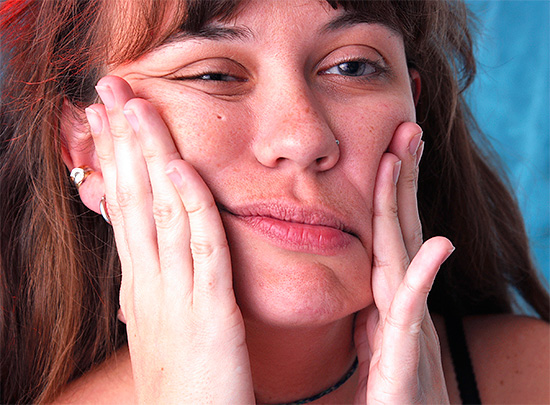
When it’s really worth the alarm after removing the wisdom tooth
Removal of the 8th tooth can have serious consequences, which in severe cases lead to abscesses, phlegmon, mediastinitis and sepsis (blood poisoning). Simply put, the more intensively the infectious process develops in the socket of the extracted tooth, the more likely it will be the spread of microbes and their toxins into the deep spaces of the lower jaw, head and neck.
The maxillofacial region is rich in large and small blood vessels. This determines the risks of the rapid penetration of microbes to vital organs and formations, which sometimes even leads to deaths.
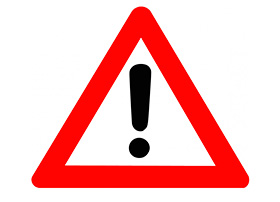
The following are cases where, in order to prevent serious consequences after removing a wisdom tooth, you should no longer expect that the discomfort will pass by itself, but you should consult a doctor:
- If bleeding from the hole does not stop for several hours;
- If the temperature lasts for 3 days or more, and even more so if there is a tendency to increase it every evening to ever higher values;
- In general, any negative dynamics is an occasion to consult a doctor. For example, if pain and swelling do not subside, but, on the contrary, progress each time, then this is also an alarming symptom;
- If there are problems with opening the mouth;
- If a putrid odor appears from the mouth, suppuration is observed from the hole;
- If numbness of the tongue, chin, lips, cheeks persists for several days.
And remember: the dentist is not your enemy. Some people are embarrassed to “strain” the problems of their treating doctors (thinking that the doctor has his own worries or that he will be offended by such “silly fears”), but this approach can lead to serious consequences. A good dentist, like no one else, is interested in ensuring that the patient is well after his services, so he is obliged to do everything possible to eliminate the problem that worries the person, or at least clarify the situation and calm him down.
An interesting video about some problems that may occur after tooth extraction
And this is how the removal of the retarded wisdom tooth occurs

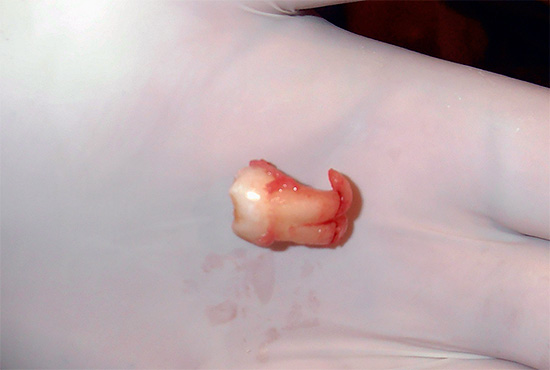
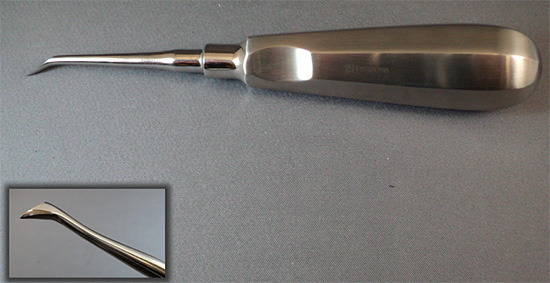
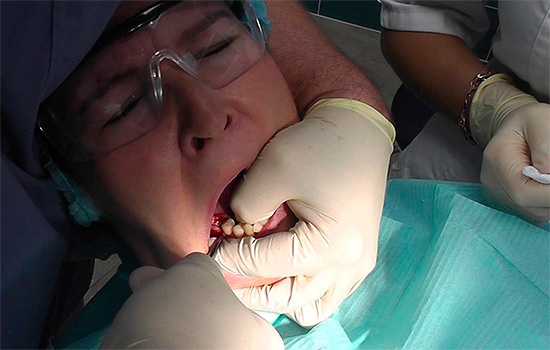
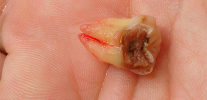
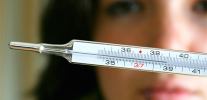

Great article, thanks.
My wisdom teeth were removed and after removal my face was swollen, the temperature was high and rotten, and what will happen now? Whose mistake is it - the doctor or the patient?
Great article! Thanks! Thanks to you, it turned out that I have paresthesia, I hope it will pass. 3rd day after removal of 3 lower molars.
Hello! Tell me, how long have you had symptoms of paresthesia?
7 o'clock
My 3rd day already lasts, it bothers me ...
Everything is detailed and clearly written! Thanks.
Thanks. Great article.
Oh, how well described. I pulled out the 8th upper. Someone with growths was, the doctor said, "mutant." He fell ill for some time, then stopped, and on the 4th day he began to twitch in his cheek, in his ear, but there was no smell. I got worried. I read the article and calmed down. Thanks.
A year ago they removed the lower wisdom tooth, they said that if she was late for a week, she could be in intensive care. After removing the horror that was happening to me, I just can’t describe it ... Heat, terrible pain, I don’t know what I want, infuriates my mother-in-law with my mother-in-law. And now again the same trouble, only on the other side it hurts. I'm afraid the same.
The bottom eight were removed for two hours, the tooth was difficult. Then antibiotics, the temperature lasted two days, the gums healed. Edema, of course, was decent. There was no bruise, although they promised him to me on the floor. What I have today, a month later: paresthesia is on the removal side, moreover, at the moment I’m in the hospital with a diagnosis of trigeminal neuralgia of the second and third branches. Backache in the temple began, in front of the ear and behind the ear, about two weeks after removal - as a result, an intolerable headache. Injection and ultrasound treatments at the local clinic did not help.He called for heavier artillery - a hospital. Hoping for the best! Good luck to everyone and good health!
How do you feel now? After the New Year, I need to remove 2 wisdom teeth, I read it, now I'm afraid ...
Do not be afraid, everything is different for everyone. I deleted the third eight yesterday. Everything is fine! If you are from St. Petersburg, I know the most beautiful surgeon.
Anastasia, what kind of surgeon?
Advise the most beautiful surgeon.
I am very afraid of removing the horizontal figure eight, the tooth has already darkened, it lies with a slope and there is chronic inflammation. Food enters between the 8th and 7th teeth, then aching, you have to rinse with soda or salt after each meal. I am from Kazakhstan, the city of Aktobe, I'm afraid to delete, I am postponing all the time!
I don’t know how to cope with the fear of removing a wisdom tooth, how afraid I am. He quickly darkened with me, although I took care, cleaned twice a day!
Dear Dina, they removed my tooth in October 2016. I was not afraid to immediately go to the dentist surgeon. According to the symptoms, namely: numbness of the left side of the face, pain when opening the jaw and pressing on the gum - I immediately realized that it was a wisdom tooth ... I came to the surgeon, they sent me for an X-ray, and this was all confirmed - the tooth was lying, i.e. . in horizontal position. They appointed the day of the operation, I came on that day. Make several injections of anesthesia. After they cut and saw, they pulled it out to me in parts. It was very difficult (judging by how the doctor sweated and puffed). The operation lasted about 2 hours. Stitched. Already at home there was severe weakness and slowly pain manifested itself. I fell asleep right away. Naturally, you will not close your jaw right away. I slept with my mouth open for about 3 hours, after which I only drank water. Liquid ate: yogurts, kefir, milk, soups. On the second day, everything will be swollen. Prescribe antibiotics, antiseptic - mouthwash. You will visit the doctor again 3 times, after 4-6 days. On the 4th day, the entire swelling completely subsided. On the 5th day, the stitches were removed. After that, I began to rinse more often, but still food got into the hole, so I visited the doctor 3 more times to flush the hole from the food ...
And all) So do not be afraid, be decisive. It’s better to get tired once than to torment your whole life)) And by the way, I immediately took a sick leave for three days and I advise you. Good luck
Hello, Julia, I’m very glad for you that everything is behind you. My tooth does not hurt, but since it grows horizontally, it is inconvenient to brush and it has already begun to darken from below. I just can’t make up my mind, I’m very afraid, after your story I’ve been a little cheered up! Thank you, I, it turns out, is not the only one so lucky.
Dear Julia! You can find out what city you are from? It's just that in our city there are few good surgeons.
Thanks for the article, very useful and affordable!
PPC, in 2007, on New Year's Day, a wisdom tooth grew and began to interfere with the jaw closing and opening. Went to removal. The upper right 8, removed without consequences, healed quickly. 2008, on New Year's Day, wisdom tooth 8 lower right, the same doctor. After the operation healed quickly, but with paresthesia. Numbness of the lower jaw (feeling as if anesthesia had not passed), right side of 1, 2, 3, 4 teeth and to the chin, a small but visible swelling. I have been living with this for 9 years, I was treated (current, leeches, acupuncture) - to no purpose, they could not help me with anything. So people, a good doctor, a bad doctor - all this is complete garbage. And now we need to remove the eights of the left side, I'm afraid ... I'm afraid not of pain, but of consequences.
The article does not describe yet another consequence, when the facial nerve is affected, and half of the face sags.
The same thing, I have been living with numbness of my lips and chin for 5 years. The tooth did not interfere, was not sick, was inside the gums. But the very "business" surgeon decided to earn extra money - he saw that the tooth sits on the mandibular canal, but it still climbed! Like, someday it can get sick ... And I was 45 years old, and I lived with this from my youth. Always go to several doctors! Do not listen to one thing, doctors have different opinions on everything! There are grabbers, just to earn money, but there are honest ones.
I sympathize with you, I, too, have come across unnecessarily “business” -altern. They also removed one wisdom tooth with which I lived normally for many years, and the clinic owner, the doctor, convinced that the teeth were “bad”, although they didn’t hurt (they would forbid them to legally insult parts of the body of people with confuse patients). Now it’s inconvenient for me without it - constantly the lower jaw hurts (the surgeon removed from the same clinic).
For some reason, for some reason, the filling was poorly done, such as "you have caries, it is necessary, necessary." Not on the tooth, which the owner and the dentist decided to “save”, but next (although I did not ask). I persuaded to remove a completely different tooth, which was damaged by a wisdom tooth, I know my jaw better, but she has a “diploma-education-the smartest”, and I have poor health.
So, I, like you, lived quietly with these wisdom teeth from my youth, about 20 years old, they protected my jaw. Now it’s very inconvenient for me to chew on the stumps that have been made to me in this clinic: there is no lower tooth left, a jaw bursting, a badly stuck adjacent tooth, a smooth tooth tooth that is not adapted to chew + a lower gum that is constantly damaged by food and the jaw touches. The only thing I'm happy with is that the second tooth (not wisdom) to another surgeon from this clinic (happy with his work) still had to be removed, and not “saved." So she avoided another smooth hemp in her mouth.
Thank you for writing. People should know all aspects of the consequences of removing wisdom teeth, and that this is not a mandatory procedure if they do not hurt.
As for the greedy in my case, I got excited, but "overly business" for sure. Take care of your teeth and organs, citizens. If some people still believe that we do not need wisdom teeth due to the very fact of their presence, this does not mean that we need to remove them and the doctors themselves treat this procedure as simple. I support Irina and Katya completely. Me, it turns out, so far lucky.
Removed the bottom wisdom tooth. They pulled it out to me quickly, in 30 minutes they managed it. The wound was sick for a long time, weeks 2 were tormented by pain, and the bleeding was about 7 days. Then, like, everything healed. There are 3 more to be removed, but I am now even more afraid of this procedure. Just as I recall all these postoperative pains, it gets bad. But that’s not the point ... 4 months have passed since the removal, and I started having pains at the removal site, my mouth does not open, the pain gives out in my ear, it is impossible to chew solid food. What could it be?
Hello! There are several suspicions:
1. The dentist-surgeon left in the hole the root of the tooth, part of it, granuloma or cyst;
2. Either there is a hidden carious process near the hole, in the 7th tooth, which crossed the border of the pulp and now there are pulpitis pains;
3. Or a complication of alveolitis - bone osteomyelitis (less likely, but worth checking).
Therefore, before you remove the next wisdom tooth, you should definitely find out the true cause of the existing acute pains (at the dentist’s internal appointment) and eliminate the problem in a timely manner so as not to leave the focus of infection. Thanks for the question.
Thanks. I went to the doctor - indeed, after an X-ray it turned out that after the removal a piece of the root remained. The dentist said that the root is in the middle of the wound and it will not be difficult to remove it. And he ended up there, allegedly due to the fact that I pushed him there with my tongue. Today I went to remove this “piece”. And ... the doctor poked around for a long time, twisted something there, but the root was never pulled out. The jaw ached terribly, and the pain began to pass to the ear. She did not pick further, explaining this by the fact that she could damage her nerves, and then it would only get worse. In general, she said that maybe she will come out herself (I do not understand how this is possible). I suspect that the mouth will not open normally now ... She also said something about the hospital. Very upset.This was my first molar extraction.
Hello! It is impossible to “push the root of the tooth back”; the doctor is deceiving you in this regard. The fact that she could not remove the complex root also does not give reason to hope that he will come out on his own. Disinformation for disinformation allows us to state the fact that you should contact another dentist-surgeon for help. Otherwise, a number of complications may be added: alveolitis, turning into osteomyelitis, abscess, and, as an option, phlegmon. So the faster you change your doctor, the better. Proceed in this direction!
After the removal of the lower wisdom tooth, which was only seen on X-ray, the numbness of the chin and lips appeared. A week has passed, the swelling has not yet passed and the pain of the jaw persists. The doctor said that the hole heals normally. I am in pain. How long can they be and is it normal?
Hello! After complex surgery, numbness can persist for up to 1-3 months, sometimes longer. Physiotherapy often speeds up the process of restoration of sensitivity (a lot depends on whether the mandibular nerve is damaged, how badly it is damaged, or if it is simply squeezed due to edema). Edema can be up to 1-2 weeks, but the trend should be decreasing every day. The pain decreases as the main symptoms disappear. If the swelling decreases, then the pain will gradually disappear. For prevention purposes, after a while it makes sense to contact your dentist again to assess the condition of the healing hole.
Good evening! A complex wisdom tooth was removed, growing horizontally at the bottom left and resting on a 7 tooth. They crushed a bone and a tooth and pulled it out in parts. The next day, the gum of the neighboring 7 tooth became very inflamed and the tooth itself hurts with the slightest pressure. They said that you need a root channel, or delete it. Could this tooth have been damaged when the wisdom tooth was removed, or did the wisdom tooth damage it so, pushing it to the right all the time? The gum from the 7th tooth is swollen severely and all in a blood clot. The doctor said that everything is fine, just this tooth needs a root canal or removal. I don’t know what to do, lose another important tooth and have a hole with a fist?
Hello! During a difficult tooth extraction of wisdom, when it rests against the seven, it is quite possible to damage the seventh tooth. Although it is too early to make a decision 1 day after the removal - usually in the first 3-7 days after the procedure, the teeth adjacent to the well react with stress. The “neck” can also be opened from the extraction side: although this is temporary, it can be very disturbing.
It’s best not to rush to conclusions, but to get advice from your doctor in a week (or earlier, if there is a negative trend): check the seventh tooth again from the picture and only then decide whether to treat the root canals or not, or whether to save the tooth or not . As for the removal - it is better to try to save the seventh tooth in all possible ways, and there, in the course of life, everything will be clear. Good luck
Hello. I have a horizontal wisdom tooth, it does not bother me, but since it lies horizontally, it is inconvenient to clean it, and began to deteriorate a little. While there is no pain! I am very afraid of deletion, I just can’t tune in any way. The doctor says: until it hurts, does not bother, you can not touch it, because it is a difficult removal. I’m very afraid. I'm from Kazakhstan. Tell me, who has the same situation? And who decided to delete, how did it go?
Hello! If the wisdom tooth, which, as you said, “lies horizontally” (and most likely you mean “by a large slope”) and has already begun to deteriorate (destroyed by caries), then it should be urgently removed. With deep destruction, pain will begin, perhaps this will go to the complication of caries, God forbid - periodontitis or even periostitis. Why would you wait for the start of a purulent complication? And so the tooth may not be simple, but there are additional difficulties for you and the doctor.Moreover, purulent processes near the wisdom teeth on the lower jaw often lead to formidable complications, even death. Scheduled, it can be much easier to uninstall.
Unfortunately, I can’t see how terrible the tooth is there and to evaluate the scale of the problem. I know many cases when the removal of such teeth took place in a matter of minutes. A week ago, a patient was sent to me to remove the “complex”, according to the outpatient physician, upper wisdom tooth. A local dentist told the patient that the tooth was "very complicated, under the gum, you will almost need to knock it out," so he did not take it, he was reinsured. In fact, it took 5-7 minutes to do this work. So do not be afraid and trust a good doctor!
Hello, I removed the retarded wisdom tooth below two days ago. The doctor said that everything went fine, prescribed baths and antibiotics. The swelling is small, but on the second day the jaw began to hurt, I can open it only a little, I can not bite. Is this normal?
Hello! On the second day, this is possible due to the fact that against the background of the trauma, local inflammatory phenomena intensify - this can manifest itself in the form of pain and swelling, which just causes a violation of the opening of the mouth. I recommend to consult your doctor for examination and correction of recommendations. Special exercises may be required to develop the jaw. This is also regulated by the doctor at the follow-up examination after surgery.
As for difficulty in biting off food, this is a frequent occurrence, since a tooth adjacent to the hole can become painful when biting due to proximity to the wound.
Good afternoon, on May 29, the hood of a wisdom tooth was cut off. After anesthesia, it was painful to swallow and open his mouth (but it opened). Today, swallowing has become easier, but opening your mouth is still uncomfortable. The doctor insists on the extraction of the tooth. But the nerve goes very close, is it worth it to remove? What are the possible consequences after such removal (I mean a distorted face or numbness)? Pictures cannot be inserted.
Hello! The reasons why the doctor insists on removing the wisdom tooth are understandable: today, specialists are inclined to avoid removing the hood at all, and immediately remove the problem tooth so that there are no complications.
As for the risks associated with the proximity of the mandibular canal: unfortunately, I do not see this clinical situation with my own eyes, so I have no right to insist on any action or reassure. Only the attending physician should decide whether to remove the tooth, correlating all the pros and cons.
If the mandibular canal with the nerve is affected, the consequences can be different. In most cases, numbness disappears within 1-3 months, but with a serious nerve injury - over the years (with physiotherapeutic treatment - faster).
I would advise you to get a consultation (in a chair) of 2-3 maxillofacial surgeons, as narrow specialists in this specificity. After they express their opinion by analyzing the position of the tooth in the mouth and in the picture, correlating with the proximity of the canal, then you will make an informed decision.
After the removal of the 8th lower tooth, the pressure rose to 170 and I can’t bring it down for a week already. I swallow pills, even at night.
Hello! In this case, there is cause for serious concern. The fact is that normally the pressure should stabilize during the day. The reasons for its long-term increase can be both the stress from the previous manipulation, and the drugs used in dentistry. Also, the influence of existing somatic diseases is not excluded - in other words, a person already comes to the dentist with cardiovascular diseases, which make themselves felt after surgery. In such cases, tooth extraction affects the onset of the problem only indirectly, and the true cause lies much deeper, requiring the attention of a cardiologist, and preferably urgent!
I removed a cyst at the root in 2014. The doctor decided to simultaneously (without my consent) remove the retarded fang (3). After removal, the sensitivity of the upper lip disappeared.After six months, she turned to a neurologist. The neurologist “reassured” - sensitivity will never return. Now is 2017. Sometimes the tip of the nose and lower lip are numb. I use heparin ointment. The sensitivity of the nose and lower lip returns. But the upper lip does not feel the temperature, unpleasant numbness is already annoying until the glow. Is it possible to lighten this condition in any way?
Hello! In your case, it makes sense to consult a physiotherapist - you may still be able to find the necessary manipulation to restore the sensitivity of the lips and nose (even despite the pessimistic prognosis of the neurologist). For example, in some cases, electrophoresis with potassium iodide and UHF in combination with taking medications helps.
Removed the lower wisdom tooth 2 months ago. Removal was difficult, 1.5 hours. I still feel the numbness of my tongue. The doctor says that it can take up to six months, or maybe not. It’s scary that it will remain so. What can be done?
Hello! If during the procedure there was damage to the mandibular nerve, then it may really take a lot of time to restore sensitivity - the dentist did not deceive you. To speed up the restoration of nerve fibers, physiotherapeutic procedures are often prescribed, the list of which is determined by the maxillofacial surgeon together with a physiotherapist.
Usually, numbness tends to decrease every month. I’m almost sure that you get into positive statistics and get rid of the problem in a few months.
They removed the bottom 7 and 8, now it is the 6th day, with periods of aching pain all over the jaw, and the teeth seem to itch. I drink painkillers. Consulted with a dentist every two days - says healing is normal. But the problem is that the cheeks inside of me became very sore, opposite to the top 8, which got out normally for a very long time and never bothered. What could it be?
Hello! I think that against the background of the injury there is an irradiation of pain in neighboring areas from the holes of the extracted teeth. I also do not exclude that the pains spreading along the trigeminal nerve may be a consequence of the onset of alveolitis, and the inflammation of the hole proceeds in a mild form, so the pains are aching. The fact that you regularly consult with your doctor is wonderful: control in this case will definitely not hurt.
I recommend you to watch some more time (about a week). If there is a tendency to reduce symptoms, then do not worry. If there are no improvements, then it will be necessary to understand in detail the situation with the attending physician and take measures.
Removed the upper wisdom tooth. The day was terribly sick, now it does not hurt, but the tumor has not yet disappeared, and the temperature rises periodically (the third day is on). But the most unpleasant thing is the nasal congestion of the right nostril and unpleasantly presses in the right temple! To panic, or will it pass? Thanks!
Hello! Urgently consult your doctor, or immediately to a highly specialized specialist - maxillofacial surgeon for a consultation. The fact is that according to your symptoms there is a risk of a connection between the removal of the upper wisdom tooth and inflammation of the maxillary (maxillary) sinus, since the roots of this tooth are often located in the immediate vicinity of the sinus. There could be a complication. If the dentist (it is possible that together with the ENT doctor) excludes sinus damage and the beginning of the inflammatory process in it, then it will be necessary to focus only on the healing of the hole. Otherwise, it is possible that you need to plan a therapy for sinusitis, which I am more inclined to according to your description.
Hello. It's me again. Thanks for answers. It’s a pity that I saw so late ... I still go with that very “spine” - I’m already used to the fact that my mouth does not open normally. A week ago, I removed the top eight from the same doctor. And again, the problem. The tooth was caries and grew sideways. They quickly removed it, the doctor prescribed neither antibiotics, nor rinses, and sent them home. In the evening, the wound began to bleed, I had to go to the dentist again - she did some compresses for an hour. There was less blood, and I was sent home.
The next day, the wound was bleeding, but bearable. On the third day (by night), severe bleeding began. There was no pain after removal at all. There was no dentist in the city, and I had to urgently decide something - I went around the clock to other doctors. They thought for a long time what was the reason (they did an x-ray, but they didn’t see any tooth residue). And blood clots fell out of the wound. Doctors decided that it was a cyst, and began to clean the wound - they scraped a lot. They put a swab on the wound, prescribed antibiotics, rinses and sent home. Today is the second day without blood. And the dentist, in whom I removed the tooth without seeing me, insists that there could be no cysts, because a pulpitis tooth, and it was just necessary to sew up the wound. Now I’m even afraid to go to her place and imagine what she would have done if she ended up in the city. In general, she is to blame for all the consequences. How can you treat patients so casually! I go to her and pay money, but I get only new sores and problems. People, be very careful when choosing a dentist.
Everything is written correctly.
Good afternoon! After removal of the wisdom tooth, taste qualities are lost. 3 weeks passed, the wound healed, but a bone got out of the gum. I still don’t feel the taste of food. What is it?
Hello! The fact that a bone fragment remains in the wound does not cause a loss in the taste of food. Numbness of the tongue that does not go away after the procedure for removing the lower molars (including the lower wisdom tooth) is directly associated with damage to the lingual nerve. Most often this occurs when a nerve is damaged as a result of anesthesia, which was brought too close during the injection.
I recommend that you contact your doctor: I think that the problem can be solved by prescribing drugs to accelerate the restoration of nerve fibers + the appointment of physiotherapeutic procedures.
It is necessary to file a lawsuit against these swaggering, confident in their untouchability charlatans ignoramus! And if it doesn’t help, he himself (in the stairwell, for example) should have “perforation of the maxillary sinus” (Makita punch, for example). Or a rhizotomy of the mandibular nerves (together with the lower jaw) with a shovel 🙂
P.S. And then charlatans-dentists have bred.
Hello. It is necessary to remove the wisdom tooth. However, after 3-4 weeks, I should begin a seasonal allergy (pollen). It manifests itself as inflammation of the mucous membranes of the nose and throat, sneezing. Sometimes it is quite strong, and antihistamines do not completely relieve symptoms. Will the hole have time to heal by then? Are there any complications?
Hello, Victor! Usually, after tooth extraction, the wound heals completely within 2 weeks. Seasonal allergies will not interfere with healing. It is also not worth fearing the subsequent use of antihistamines (in some cases, they even help the quick healing of the hole).
So you can now plan to remove the wisdom tooth and not worry about possible complications from an allergy to pollen.
Hello. Two weeks ago, 8 were removed on the right side of the upper jaw.The gum where the anesthesia was done was very painful, the wound also did not heal, but did not bleed. She began to rinse the place of removal with Rotokan immediately after a day - a cotton wool fell out of the hole (as I understand it, the doctor forgot to remove it). The wound began to heal, but the gums on the inside hurt. But she was not swollen, there was no redness either, but it hurt as if you were pressing a bruise. And the next tooth, 7, started to hurt. Could these be complications?
Hello, Catherine! Yes, these may well be complications that arose after tooth extraction. The pain you describe is partly similar to the symptoms of alveolitis (although it may seem that the pain has arisen solely due to trauma to the gums during anesthetic injection). As for the “fleece” forgotten by the doctor, doctors often leave a hemostatic collagen sponge in the hole of the removed tooth so that there is no bleeding from the hole. Complications may arise due to the fact that you could wash the blood clot from the hole and it became empty, as a result of this often pain occurs. With regard to pain in the 7th tooth, this may be the irradiation (spread) of pain from the socket of the 8th tooth.
Since the pain persists for more than 2 weeks, and this is not normal, I recommend that you consult a dentist for an examination.
Good morning everyone! 10.24.2018 I got the lower left eight removed. The next day, I came to the doctor’s appointment with pain and swelling in the area of the left gland, my mouth did not open. The doctor looked, washed superficially from a syringe and said that everything was fine (there was a difficult removal). A day later, on Saturday, due to the inability to endure pain and due to severe swelling in the area of the chin, I came to the maxillofacial surgery. There I underwent an autopsy in the hyoid area and the removal of pus. In the hospital, I spent 2 weeks after opening the FLEGMONS. Today 11/08/2018 I do not feel part of the tongue and my mouth does not open well. By the way, the dentist cut the tooth with a machine when removing the tooth and immediately removed the wound after removal.
Tell me, please, what should I do now? And whose fault is this?
Hello, Sergey. It is almost impossible to comment on the work of other doctors, especially without having pictures on hand before and after tooth extraction. I do not exclude that the hyoid nerve was affected (then recovery will be long). I recommend that you contact an experienced maxillofacial surgeon, he will help you understand the problem in more detail, make a prognosis and prescribe treatment.
Five days ago, removed the bottom eight on the right. On the second day, a swelling of the cheek, as it should be. On the third day I slept a little, but by the evening the temperature was 37.2, it hurts to open my mouth and gives up with sudden movements. He began to take antibiotics and rinse. On the fourth day, the tumor again subsided slightly, a firm seal (painful) began to be felt on the cheek from the outside, and again in the evening the temperature was 37.1. On the fifth day I went to the doctor. A hematoma was found somewhere in the removal zone. We had a painful cleansing. They put something in the wound (similar to cheesecloth) and sent home, setting up the next visit in two weeks. Now (the sixth day), even without painkillers, there is almost no pain, the mouth is open, the tumor has subsided significantly, but the seal on the jaw has not yet passed. The question arises: will I stretch out until this next visit to the doctor in this state?
Hello, Yuri. Your condition is fully consistent with the severity of the operation. A medicine that “looks like cheesecloth” is an antiseptic, it prevents the development of alveolitis. The seal can hold up to 1 month. Judging by the description, now your healing is going well and there are no unplanned visits. However, examinations prescribed by the attending physician are useful and necessary. Be healthy!
On February 2, she removed the lower 8th tooth. Removal lasted 2 hours 30 minutes. Anesthesia was added twice. The second time I asked (with tears) to add from the cheeks, as everything was felt. Three times the doctor left for 2-5 minutes to rest and giving me rest. During removal they soldered me with Corvalol, opened the window (apparently seeing my condition). After removal, rinsing, painkillers and antibiotics were prescribed. On Monday I was at the doctor's appointment - my health was normal. But from Tuesday I began to feel incredible weakness. Unpleasant soaps about a heart attack or pre-infarction condition climb into my head. The temperature is strange: 36.8 - 36.9, does not rise to 37. Is it worth the alarm? Today I haven’t gone anywhere from home (just in case).
Hello! I do not exclude that your condition is caused by stress and emotional experiences. There is no need to talk about a significant inflammatory process - otherwise there would be severe pain and high fever. In addition, you take antibiotics, which makes the version of inflammation of the hole even less likely. It is not necessary to pump yourself up too much, but you should monitor the further dynamics - if it gets worse, you need to see a doctor before the appointed deadline for the follow-up examination. Or, if the weakness is too strong, call an ambulance.
Hello. After removing the wisdom tooth from below (on the right side), the lip and chin were numb. Front teeth hurt and severe headaches persist for a week. And the lips are still very dry. Can headaches be associated with numbness of the lips and chin?
Hello! After a complicated extraction of a wisdom tooth, numbness may occur due to compression of the nerve trunk by a hematoma (i.e., spreading blood). Very rarely, when removed, the doctor can mechanically damage the nerve bundle. I think that this is not your case. After hematoma compression, sensitivity is usually restored within a month. The most important thing here is the dynamics: it should be better with every week. Pain in the front teeth can be associated with irradiation from the hole: you need to check it for the presence of alveolitis (the doctor may also suggest taking a picture to determine the cleanliness of the tooth extraction - if there are any broken roots or fragments in the hole). Be sure to get a full-time consultation with a doctor.
Hello. 01/21/19 I was removed the bottom 8s on both sides. The operation was under general anesthesia. The teeth grew horizontally and were partially located in the bone. Until today (02/18/19) there is a numbness of the chin, headaches and pain in the jaw. On the left side, the edema inside the oral cavity has not yet descended. I bite my cheeks and for the 8th soft tissue. I constantly drink analgesics. I apply the ointment on the basis of antibiotics and lidocaine. A maxillofacial surgeon sees nothing wrong. Is there any doubt in his opinion?
Hello Olga! After a complex double extraction of wisdom teeth, not very pleasant symptoms will always be present. Let's sort out every sign. So, chin numbness: this is a frequent result of hematoma compression of the branches of the mandibular nerve. Since it was a deep and traumatic operation, this is entirely justified. I do not think that the surgeon injured the nerve trunk itself. This is very rare, and in my memory there were no such cases. But with respect to hematoma (blood) compression, I can say that 2-3 months are enough for numbness to pass. Usually this phenomenon comes to naught gradually - slowly but surely numbness decreases, and sensitivity returns.
Headaches - this may not even be the result of the removal itself, but the fact of stress and impaired general condition and well-being.Unfortunately, I do not know if you have cardiovascular diseases - there may be a connection between tooth extraction and high blood pressure (as an option for a post-stress state).
Regarding jaw pain, traumatic tooth extractions are often accompanied by pain for several weeks. The only question is their intensity. I think that this point should be agreed with the doctor, since the month of “on painkillers” is, in my opinion, a bit much. As for biting my cheeks, it’s strange for me, because it’s the eighth teeth that most often bite, and now there are definitely no antagonists, there is nothing to bite. Maybe you should look at the position of 7 teeth. Perhaps they are located on the cheek side, and it is they who bite the cheek.
As for your doctor's prescriptions, I cannot dispute them in absentia. Each doctor guides the patient through an individual course of home therapy. I would doubt only about taking analgesics for almost a month and checked the bite of my cheeks. If analgesics are justified, then to reduce their negative effect on the body, you can choose a drug that is taken 1 time per day (there are such).
Good afternoon! I have all 4 "eights" began to grow 11 years ago. The upper left started to hurt a lot 10 years ago, and I removed it. Everything went perfectly, only when tearing the tooth broke off, but immediately got it all. About 1.5 years ago, the upper right 8 started to hurt. I drank Ketorol for about 2 weeks, because I was afraid to go for removal. Caries began, the walls of the tooth began to crumble, the pain went away. Until yesterday, everything was fine.
Yesterday morning, when I opened my mouth and just a smile, I started to ache (upper right 8). I didn’t take anything. This morning the pain intensified, as the tooth walls almost crumbled (1 mm left on each side), the gum swollen in the middle, I touch it and it hurts. The tooth grows exactly with everyone in a row. I signed up for a dentist surgeon, I’ll get to him only after a week, since everything is busy. The cheek is slightly swollen, the gland hurts on the right side, presses on the temple, and numbness is felt from the face. This is dangerous? Will it be a week, or should I look for another doctor?
Hello, Alexandra! In such a situation, you should not wait for a whole week in any case, the symptoms described by you indicate the beginning of the inflammatory process, which in some cases develops rapidly. Therefore, to reduce the risk of serious complications, it is urgent, now to see a doctor.
We removed the root of the eight on the right (on the lower jaw) very quickly, in two steps. There was almost no blood. Anesthesia did not pass 9 hours. Three days have passed - everything seems to be normal, but his right ear is blocked and hears almost nothing. Is this the norm and what to do in such a situation?
Hello, Natalia! Removing the 8th tooth on the lower jaw is often a rather complicated procedure, during which the temporomandibular joint is sometimes overloaded - this can lead to a feeling of stuffiness in the ear. If there is no positive dynamics in the coming days, it is better to consult a doctor to clarify the situation.
Good evening. Two lower eights were removed under anesthesia (on Friday). On the right side, part of the bone had to be removed. The doctor (maxillofacial surgeon) said that they had drilled for about 15 minutes. For three days she was in the hospital, decongestants and antibiotics were dripping and pricking. On the fourth day they let me go home. The pain became stronger on the right side, on the left side, the swelling on the left was asleep, on the right it became less. Bruises appeared on both sides. From the side where the bone was removed, the pain spread to the fangs, and it also hurts under the jaw. I rinse with chlorhexidine.
Is it normal that it hurts more? Maybe the pain was not so severe in the hospital due to droppers? I drink ketalong.
Hello Svetlana. I suppose you yourself understand that a significant increase in pain is far from normal. I can say that the negative dynamics in your case requires immediate medical attention, as quite dangerous complications are not ruled out.
I removed the upper 8-ku, I got a perforation of the maxillary sinus. Immediately discovered, sewn up, no pain, heals normally. But it worries that blood flows down the back of the throat all this time. There is no nasal congestion, swelling has almost disappeared. There are basically no complaints. After removal, a week has passed. Is it normal that there is still blood flowing in the throat? What to do?